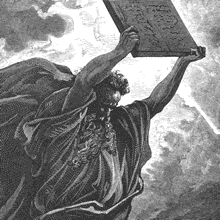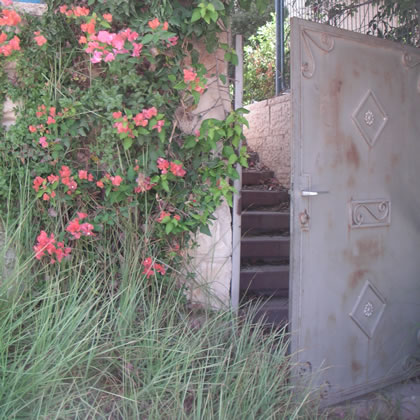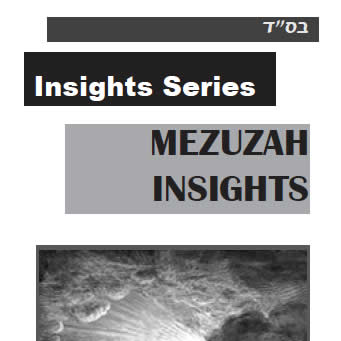Mezuzah Insights
View the printable (PDF) version
A room or house is a microcosm of the universe, an isolated domain where the ultimate relevance of spirituality tends to become obscured. This is one of the principle reasons for the words of the Torah stating that mezuzos be placed on our doorposts. Mezuzah is testimony to the absolute Oneness of Creation. This mitzvah also reminds us of the Creator’s continuing guidance and involvement with the world, and similarly, that mans’ deeds influence action and Providence over us. The final words concern the Divine Promise of the Holy Land -–the implication is of both a material and a spiritual realm. There is great additional meaning and mystery-–the symbolism of the Hebrew letters and language itself alludes to untold meaning. The Torah’s basic message too, is synonymous of symbolism and divine wisdom relevant to the human condition and spiritual pursuit, and though appealing to all, remains totally unique in the world.
Below is an English translation of the mezuzah:
Hear O Israel, God is the Lord, God is One. And you shall love God, our Lord, with all of your heart, and with all of your soul, and with all of your might. And these words which I command of you this day, shall be upon your. And you shall teach them to your children and speak of them when you dwell within your home and when you journey on the way, and when you lie down and when you rise. And you shall bind them as a sign upon your arm, and they shall be as a front piece before your eyes. And you shall write them upon the doorposts of your home, and upon your gates.
And it shall come to pass, if you will diligently hearken to My Commandments which I command you this day, to love God, your Lord, and serve Him with all of your hearts, and with all of your souls, that I will give the rain of your land in its season, the early rains, and the latter rains, that you might gather in your grain, and your wine, and your oil. And I will give grass on your field for your cattle, and you shall eat and be satisfied. Take heed to yourselves, lest your hearts be deceived, and you turn aside, and serve other forces, and worship them, and the anger of God be kindled against you, and He shut up the heavens, that there be no rain, and the land cease from bearing her fruit, and you be abruptly taken from off of the good land which God gives you. Therefore, place these words upon your hearts and upon your souls, and bind them for signs upon your arms, and they shall be as front pieces before your eyes. And you shall teach them to your children, speaking of them when you sit in your home, and when you journey on the way, and when you lie down, and when you arise. And you shall write them upon the doorposts of your home and upon your gates, that your days may become long, and the days of your children, upon the land that God swore unto your fathers to give them – as the days of the heavens on the earth.
SOME SHORT MEZUZAH STORIES
When Onkelos son of Kalonykus became a Jewish convert, (he was the son of the Emperor Titus’s sister), Titus sent a contingent of Roman soldiers after him, but he enticed them by citing scriptural verses and they likewise converted to Judaism. Thereupon, the emperor sent another roman cohort after him, bidding them not to initiate any conversation with him. As they were about to take him away, he said to them: ‘Let me tell you just an ordinary things: In a procession, the torchlighter carries the flame in front of the torchbearer, the torchbearer proceeds in front of the leader, the leader in front of the governor, the governor in front of the chief officer; but does the chief officer bear the lamp in front of the people that follow?’ ‘No’, they replied. He said, ‘Yet the Holy One, blessed be he, does carry the light before Israel, for Scripture says, ‘And the Lord went before them…in a pillar of fire to give them light’ (Exodus 13,21). Then they, too, converted. Again he sent another cohort, this time ordering them not to converse with him whatsoever. So they took hold of him; and as they proceeded, he observed the mezuzah which was fixed on the door-frame, and he placed his hand on it, saying to them: ‘Now what is this?’, and they replied: ‘You tell us then’. He said, ‘According to universal custom, the mortal king dwells within, and his servants keep guard on him from without; but in the case of the Holy One, blessed be he, it is His servants who dwell within, while He keeps guard on them from without; as it is said: ‘The Lord shall guard thy going out and thy coming in from this time forth and forevermore’ (Psalms 121,8). Then they too, converted to Judaism. Titus sent for him no more.
Talmud; Avoda Zorah 11a
The Almighty says; “If a man affixes a mezuzah, then I have truly given him the house”.
Yalkut Shimoni to Job 41,3
Mezuzos and other scribal writings are composed on animal parchment, so that the teachings therein always be remembered. This idea also appears concerning Adam and Chavah (Eve). ‘And the Lord God made garments of skins for the man and his wife, and clothed them’. The Torah later states; ‘This book shall never cease from your mouths’. This is understood as a proclamation that kosher animal skin also be used as the parchment for the transcription of the Torah, since it only can impart a great enough sense of importance toward the Torah’s teachings. A mezuzah is attached to the doorpost in the form of a rod, in order to subdue the spirit of foolishness, since the rod or staff has numerous spiritual connotations.
R. Nosan of Breslov; Likutei Halachos
When leaving and entering a dwelling, one should acknowledge God’s supreme Sovereignty and constant Involvement with Creation, and remind oneself of His great love toward the Jewish people especially.
Code of Jewish Law
The Lubavitcher Rebbe was once asked if it would help to check the mezuzos of a woman’s home who was suffering in the hospital from protracted labor. His answer was yes.
Likutei Sichos 22
THE BLESSING ON MEZUZAH
The circumstances of this blessing are discussed in detail within this brochure.
‘Amain’ is answered to the blessing. The mezuzah should be affixed right away without interruption of unrelated speech or delay of time.
DOORWAYS THAT NEED A MEZUZAH
Mystical Jewish traditions as explained by our rabbis of old define the types of areas that should have a mezuzah. It is written in the Torah, “And you shall write them upon the doorposts of your house and upon your gates”. Perhaps, the sages suggest; I might wrongly think to also include an outhouse or bathroom, a bathhouse, or a ritualarium, (a building or room housing a mikvah)? Therefore, the verse indicates ‘house’. Just as a home is a dignified dwelling, so too must all dwellings or rooms be such to require a mezuzah; which thereby excludes these. Perhaps, the sages suggest; I might wrongly think to also obligate the Temple Mount (in Jerusalem), the Holy Temple’s meeting chambers, or Its courtyard? Therefore, the Torah teaches ‘house’. Just as a house has no intrinsic holiness, so too, must all buildings and rooms be of a merely ordinary nature to require a mezuzah–excluding all such as these, which exist from a purely spiritual purpose. There are ten general characteristics defining a dwelling or room to determine the need for a mezuzah.
1) The room must have both a length and breadth of not less than four amos or handbreadths each. (An amah is usually considered as roughly equivalent to 1-1/2 feet, but alternatively, as 2 feet).
A room with length and breadth each less than 6 feet (4 amos at 1-1/2 feet each) would therefore not require a mezuzah.
The popular tradition though is to only not affix a mezuzah at the doorway of a room with a total floor space of less than 36 square feet (the equivalent of 6 feet of both length and breadth dimensions).
If only one wall’s measure is greater than 6 feet, then, in these situations, the mezuzah is attached without reciting the blessing, due to the sages’ difference of opinion as to the necessity, as just discussed.
2) The entranceway must have posts or walls extending inward to form doorposts on both sides.
3)…and a lintel-–the crosspiece on top. This too, may be of wall material extending down from the ceiling.
4) The dwelling must have a roof.
5) The enclosed area needn’t have a door, but must have a doorway as described above. (If only part of the conditions of a doorway exist, a mezuzah is often affixed, but without a blessing).
6) The doorposts must be at least ten tefachim or fist-breadths high. (The most commonly accepted opinion is that a tefach is equivalent to 3-3/4 inches. Therefore, ten tefachim are equal to 37-1/2 inches–slightly more than a ‘yardstick’).
7) The dwelling or room must be of a secular, non-sacred nature. Therefore a room used exclusively for communal prayers, and which is usually home to a Torah scroll is exempt.
8) The domain must be generally fitting for human habitation. This exempts silos and barns, and certain other industrial and agricultural settings. Some rabbinic opinions also exempt offices, stores, and other habitable buildings or rooms in industrial areas. However, this opinion is often regarded as overly lenient.
9) The dwelling must be of a dignified nature (one where the self-centered nature of man is not apparent); thus are exempted bathrooms, saunas, steambaths and the like.
10) The dwelling must be of a permanent type-–which thereby excludes succos, tents, removable stalls, and similar enclosures. Houseboats, motorhomes and campers which are used as one’s regular dwelling place, however, would require a mezuzah (or mezuzos).
Additionally…
-A house which has several entrances or doorways should have a mezuzah on each one, even though they may not all be used.
-A doorway to an attic room or upper story should also have a mezuzah, even if entrance is only by way of a ladder or other non-typical means.
-The inner rooms of a house-–even a room within a room, should all have mezuzos-–as long as all are fitting for habitation.
-The sages explained the verse: “…and upon your gates”. This part of the verse comes to teach that whether the gates surrounding houses, or of courtyards; of countries or of towns; barns or stables; animal coops, silos, wine cellars, or of oil cellars; all should have a mezuzah. To be rabbinically considered as a gate however; the area must be fully walled on all sides; have doorposts and a lintel–as just discussed, but need not have a roof. Also, the gate walls must be consistently at least 10 tefachim high (37-1/2 inches as discussed).
AFFIXING THE MEZUZAH
The mezuzah should be of authentic parchment of a kosher animal species, and hand written in scribal Hebrew, according to the many and complex laws of the Jewish scribal arts.
The mezuzah is rolled so as to enclose its contents first from the left–so that the Hebrew can be read as it is unrolled.
The blessing should be said before affixing a mezuzah if the room’s length and breadth are both 6 feet or greater, and if a valid mezuzah has not been affixed to the doorpost for thirty days or more. Otherwise; the blessing is not said, being of unnecessary or questionable circumstance.
If affixing more than one mezuzah on the same day, the blessing is only said once, as long as it was intended that the others would also be affixed that day. It is preferable that all should be affixed within a short time of each other, so that there be as little interruption as possible between the blessing and the deed.
For a room with either the length or breadth less than 6 feet, (but with total floor area of at least 36 feet, as discussed), a mezuzah is usually affixed without a blessing. There is also a view that does not require a mezuzah to be affixed at all in such rooms. Therefore, it is best to affix mezuzos at such doorways when a blessing has been said over the attaching of a mezuzah at another doorway-–one that undisputedly requires a blessing.
The divine name of the Hebrew letters shin, dalet, and yud: ‘sha-dai’, which appear on the outside of the scroll when it is rolled up, should face the doorway open space; and when placed within a case, should likewise face the front of the case.
The mezuzah should be hung from the right doorpost as one is led further within the recesses of the room or dwelling. It should be placed near the lower half of the upper third of the doorpost, with the top of the mezuzah slanting inward.
The sages advise that individually owned mezuzos be checked twice every seven years, and those of the community, (such as of a city or town wall), once in fifty years (a ‘jubilee’ or yovel timeframe). The reason they are checked is to be sure no letters have become unrecognizable due to insects, damp walls, or the like.
A mezuzah should be placed within a wrapping or case, and attached with either nails or screws. If this is not feasible because of hard doorpost material such as one constructed of steel, a piece of wood or other softer material would be glued to the doorpost–the mezuzah then nailed to this surface. Gluing, taping, or otherwise affixing the mezuzah can also be done.
If the mezuzah is for a room where social dignity is occasionally compromised, such as a bedroom, it is preferable that it be wrapped in an opaque wrapping such as in foil or kraft paper before being placed in the case or outer wrapping.
Though much time may have past in which one could have attached mezuzos, it is always incumbent that they be affixed–so long as one still resides in the dwelling.
“And you shall write them upon the doorposts of your home and upon your gates, that your days may become long…”
Deuteronomy 11:20-21



